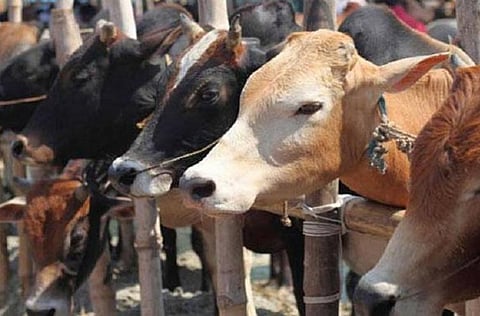

In 2015,the DailyMail wrote about young girls in Southeast Asia who were being injected with the hormone drug Oxytocin to help them reach puberty faster and who were then forced into sex work. The hormone was already under scrutiny in India after it was found that dairy farmers were artificially increasing milk production in cows by injecting them with Oxytocin. After much speculation, the Ministry of Health and Family Welfare has announced that there will be a ban on the manufacturing and sale of the drug for domestic use by companies in the private sector from July 1.
Karnataka Antibiotics and Pharmaceuticals Limited (KAPL), a public-sector company will be the lone manufacturer of Oxytocin.
“The Oxytocin formulations meant for domestic consumption will be supplied by the manufacturer, i.e. KAPL, to the registered hospitals and clinics in public and private sector directly. Oxytocin in any form or name will not be allowed to be sold through retail Chemist. All the registered hospitals and clinics in public and private sector in the country are advised to contact KAPL and place their orders with the company as the drug will not be available with retail chemists or any other manufacturer,” read the press release issued by the Ministry of Health and Family Welfare.
Oxytocin formulations ban to come into effect from 1st July 2018: @MoHFW_INDIA https://t.co/7Sc0eXaL0u pic.twitter.com/Z0mxGZY55a
— PIB India (@PIB_India) June 27, 2018
Oxytocin is used in medical practice to induce labour in pregnant women, as well as to control bleeding after childbirth. Women, who have had an incomplete miscarriage are also sometimes administered Oxytocin to stimulate uterine contractions.
Early onset of puberty, mood swings, abnormal heart rate are some of the side effects observed in those who have been treated with excess Oxytocin.
“The hormone has been misused over the years. From increasing milk production in cows, to injecting young girls to induce puberty, and so on, there has been a lot of misappropriation of it,” says Sreenath RN, Head of Research and Development at Karnataka Antibiotics and Pharmaceuticals Limited (KAPL), “It’s high time that such a ban came into effect.”
While other pharmaceutical companies and manufacturers can still produce the hormone, the government has given permission only to KAPL to be the sole manufacturer of the drug for domestic use. “KAPL meets the World Health Organisation (WHO) standards of manufacturing and production of drugs. We are the only public-sector company with WHO accreditation, which is why it was decided that KAPL would be the only manufacturer of Oxytocin for domestic use,” adds Sreenath.
The hormone was rampantly available in all pharmacies and hospitals for public consumption, which contributed heavily to its unregulated use.
KAPL will be the one-point source for the hormone, hospitals and public health centres will have to contact the company to procure it.
The Drug Technical Advisory Board (DTAB) has mandated that there be a ‘Track and Trace’ system implemented to allow for tracking the use of the hormone, “In about six to eight months, we will be able to have such an infrastructure in place wherein we will be able to track every ampoule of the drug and where it is being utilised, but it will take time to set it up.”